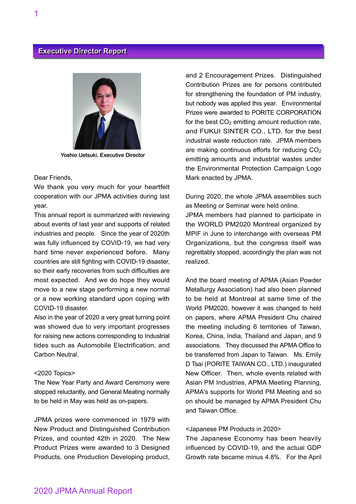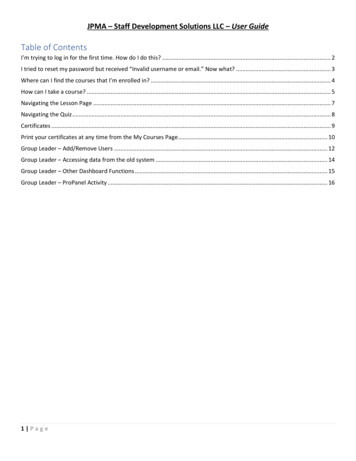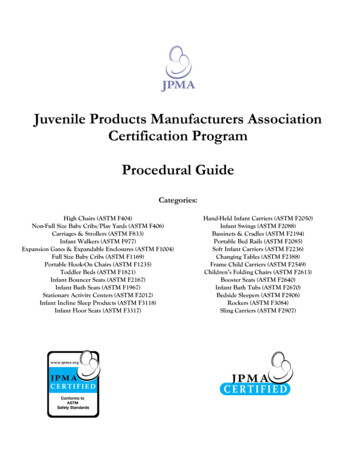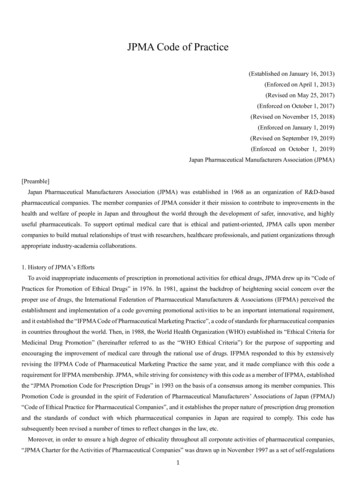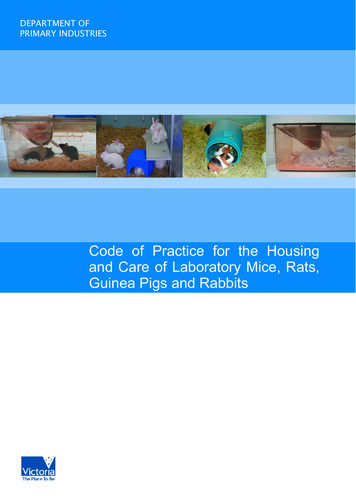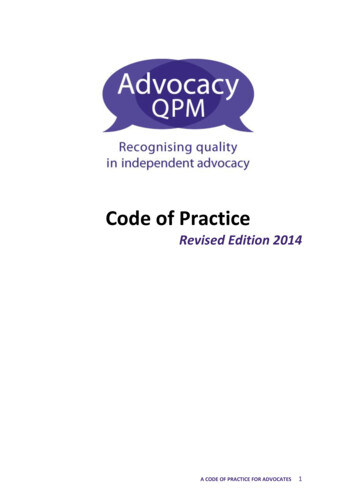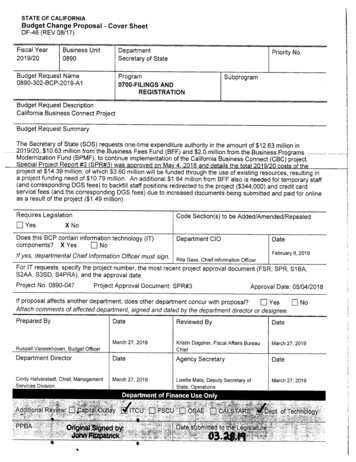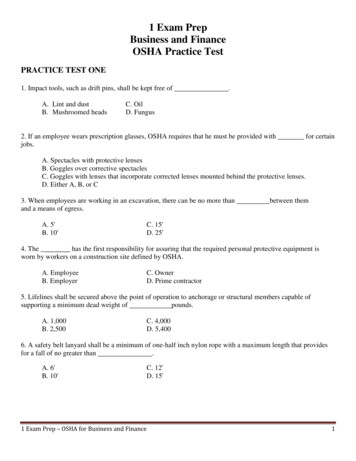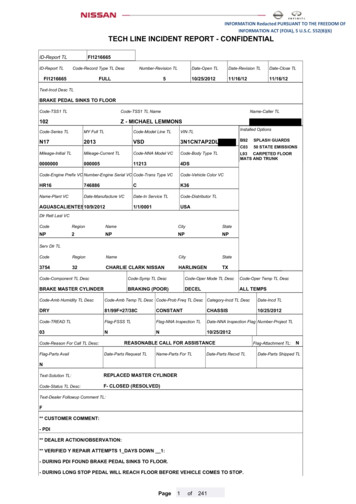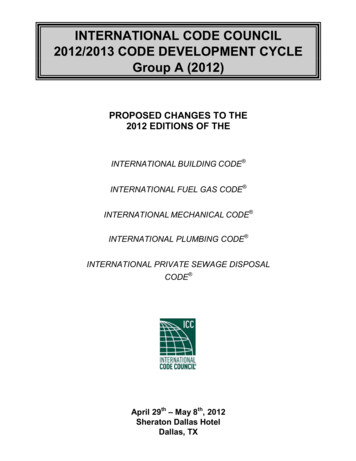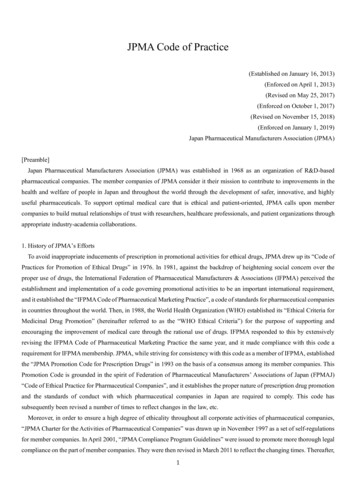
Transcription
JPMA Code of Practice(Established on January 16, 2013)(Enforced on April 1, 2013)(Revised on May 25, 2017)(Enforced on October 1, 2017)(Revised on November 15, 2018)(Enforced on January 1, 2019)Japan Pharmaceutical Manufacturers Association (JPMA)[Preamble]Japan Pharmaceutical Manufacturers Association (JPMA) was established in 1968 as an organization of R&D-basedpharmaceutical companies. The member companies of JPMA consider it their mission to contribute to improvements in thehealth and welfare of people in Japan and throughout the world through the development of safer, innovative, and highlyuseful pharmaceuticals. To support optimal medical care that is ethical and patient-oriented, JPMA calls upon membercompanies to build mutual relationships of trust with researchers, healthcare professionals, and patient organizations throughappropriate industry-academia collaborations.1. History of JPMA’s EffortsTo avoid inappropriate inducements of prescription in promotional activities for ethical drugs, JPMA drew up its “Code ofPractices for Promotion of Ethical Drugs” in 1976. In 1981, against the backdrop of heightening social concern over theproper use of drugs, the International Federation of Pharmaceutical Manufacturers & Associations (IFPMA) perceived theestablishment and implementation of a code governing promotional activities to be an important international requirement,and it established the “IFPMA Code of Pharmaceutical Marketing Practice”, a code of standards for pharmaceutical companiesin countries throughout the world. Then, in 1988, the World Health Organization (WHO) established its “Ethical Criteria forMedicinal Drug Promotion” (hereinafter referred to as the “WHO Ethical Criteria”) for the purpose of supporting andencouraging the improvement of medical care through the rational use of drugs. IFPMA responded to this by extensivelyrevising the IFPMA Code of Pharmaceutical Marketing Practice the same year, and it made compliance with this code arequirement for IFPMA membership. JPMA, while striving for consistency with this code as a member of IFPMA, establishedthe “JPMA Promotion Code for Prescription Drugs” in 1993 on the basis of a consensus among its member companies. ThisPromotion Code is grounded in the spirit of Federation of Pharmaceutical Manufacturers’ Associations of Japan (FPMAJ)“Code of Ethical Practice for Pharmaceutical Companies”, and it establishes the proper nature of prescription drug promotionand the standards of conduct with which pharmaceutical companies in Japan are required to comply. This code hassubsequently been revised a number of times to reflect changes in the law, etc.Moreover, in order to ensure a high degree of ethicality throughout all corporate activities of pharmaceutical companies,“JPMA Charter for the Activities of Pharmaceutical Companies” was drawn up in November 1997 as a set of self-regulationsfor member companies. In April 2001, “JPMA Compliance Program Guidelines” were issued to promote more thorough legalcompliance on the part of member companies. They were then revised in March 2011 to reflect the changing times. Thereafter,1
based on the revision of “Charter of Corporate Behavior” by Keidanren (Japan Business Federation) in October 2017, “JPMACharter for the Activities of Pharmaceutical Companies” and “JPMA Compliance Program Guidelines” were revised inOctober 2018.In March 2012, IFPMA announced its “IFPMA Code of Practice” (hereinafter referred to as the “IFPMA Code”) as a codecovering not only marketing activities but also exchange with healthcare professionals, medical institutions, and patientorganizations, as well as the promotion of pharmaceuticals, to replace the existing “IFPMA Code of Pharmaceutical MarketingPractices.” In line with the tenor of this revision of the IFPMA Code, JPMA established its “JPMA Code of Practice”(hereinafter referred to as the “JPMA Code”) in January 2013 to expand upon the existing JPMA Promotion Code forPrescription Drugs while governing exchange between all of the executives and employees of the member companies andresearchers, healthcare professionals, and patient organizations, and this JPMA Code has been enforced since April of thesame year and was revised in May 2017, which took effect in October 2017.In addition, to ensure that pharmaceutical companies fulfill their responsibilities regarding information disclosure andaccountability for payments to healthcare professionals and medical institutions from the standpoint of conflicts of interest,etc., JPMA established “Guidelines for Transparency of Relationship between Pharmaceutical Companies and MedicalInstitutions, etc.” (hereinafter referred to as the “Medical Institutions Transparency Guidelines”) in January 2011 and hascontinued to revise it as needed. In accordance with their own guiding principles based on these Guidelines, the membercompanies have been publicly disclosing such information since fiscal year 2013 with the consent of healthcare professionals,medical institutions, etc. Similarly, with respect to relationships with patient organizations, “Guidelines for Transparency ofRelationship between Corporate Activities and Patient Organizations” (hereinafter referred to as “Patient OrganizationTransparency Guidelines”) was established in March 2012, and such information has been publicly disclosed since fiscal year2014.At this time, based on the revision in June 2018 and the enforcement thereof in January 2019 of the IFPMA Code, we intendto revise the JPMA Code. The revised version is to be enforced as of January 2019.2. Ethics of Pharmaceutical CompaniesIn general, competition in corporations has a natural tendency to heat up to an immoderate extent, and we cannot deny thatthis kind of conduct existed in drug promotion in the past. For this reason, numerous legal regulations and industry selfregulations have been established today, beginning with the “Law on Securing Quality, Efficacy and Safety of ProductsIncluding Drugs and Medical Devices” (hereinafter referred to as the “Drugs and Medical Devices Law”) and including the“Fair Competition Code concerning Restriction on Premium Offers in Ethical Pharmaceutical Drugs Marketing Industry”(hereinafter referred to as the “Fair Competition Code”), “Guideline for the Preparation of Product Information Brochures ofEthical Drugs” (hereinafter referred to as the “Guideline for Brochure Preparation”), and the “Guidelines for the Training andEducation of MRs”. As is generally known, drugs have the following characteristics.(1) We cannot know the nature of a drug by its appearance.(2) Drugs have both effects and side effects, the occurrence of which differs from patient to patient.(3) Thus, drugs that are not accompanied by correct drug information cannot truly function as medicine.(4) Patients who require treatment are the only consumers, and consumption cannot be created by sales promotion.It is because drugs have these characteristics that the numerous legal regulations and industry self-regulations mentioned inthe opening are necessary.2
At the same time, the environment surrounding pharmaceutical companies is becoming more diverse and complicated, andevents that cannot be fully addressed by the philosophies and methods of the past are occurring one after another. In addition,society is calling on pharmaceutical companies to bring greater fairness and transparency to their relationships with healthcareprofessionals. Under these conditions, disregard for the special nature of drugs could inflict significant damage on patientsand society, opening the way to health hazards or unnecessary use of drugs. It is clear that this would have miserableconsequences for both society at large and the companies themselves, which would suffer a self-inflicted loss of credibility,extending to their products and the entire pharmaceutical industry. Needless to say, companies have nothing to gain – butmuch to lose – from such activities. This means that rather than seeing these legal regulations and self-regulations as “thingswith which we have to comply”, member companies need to perceive them as “reflections of society’s expectations forpharmaceutical companies” and adopt a broader perspective to understand and own these regulations in the context of theirsocial background and the purpose for which it is established.It is easy to understand that corporate activities based on this sense of ethics establish a priceless foundation in the form of“public trust” towards drugs and pharmaceutical companies. This becomes even more evident if you examine pharmaceuticalcompanies from the vantage point of an individual patient or a member of society. As a member of a community (be it a family,a workplace, or a region), everyone has a role that he or she is naturally expected to perform. Society works on the assumptionthat each member performs a certain anticipated role. Any society will crumble if this premise does not hold.The same applies to companies. And when we look at this from the standpoint of drugs, it is clear that members of societyassume that high-quality drugs are being used properly when they receive healthcare, irrespective of whether or not there arelaws and self-regulations in place. This is why it is particularly important for the pharmaceutical industry to perceive“Corporate Social Responsibility (CSR)” as an important mission.The character "rin" used as the first component of the Japanese word "rinri" (meaning “ethics”) signifies our mutualexpectations with regard to human and social relationships. This means that member companies are called upon not simplyto comply with legal regulations and self-regulations, but also to adopt the stance of proactively responding to society’sdemands and expectations.3. Basic PrinciplesAdvances in medical and pharmaceutical science and improvements in public health depend on the information-sharinginteractions by the entire medical community, which embraces researchers, healthcare professionals, patients, wholesalers,and JPMA member companies. Integrity is essential to these interactions, and there must be confidence that decisions aremade on an ethical and patient focused basis.JPMA sets forth the basic principles of corporate behavior in the JPMA Code to ensure appropriate interactions betweenthe member companies and external stakeholders (hereinafter referred to as “stakeholders”).The JPMA Code helps member companies accomplish their mission of making great contributions to public health in Japanand throughout the world while complying with a code of conduct based on high ethical standards. The Code’s standards ofbehavior apply to all interactions between member companies and stakeholders.JPMA’s member companies bear the responsibility to perform their corporate activities with high ethicality andtransparency. They are called upon to foster awareness of the JPMA Code throughout society, beginning with researchers,healthcare professionals, patients, and wholesalers, and to promote activities based on the Code. Each member company needsto establish its own “in-house code” that reflects the spirit of the JPMA Code but lends more concreteness and specificity to3
the requirements through the addition of elements of its own management philosophy and other unique provisions.Moreover, the criterion for judgment of the member companies’ own conduct must always be whether or not that conductconforms to the spirit of the JPMA Code, regardless of whether or not the conduct in question is concretely described in theJPMA Code.However, at times of major natural disaster or other emergency, it shall be necessary to adopt a flexible stance that giveshighest priority to respect for human life.Composition of the JPMA CodeThe composition of the JPMA Code is as follows. Preamble, 1. History of JPMA’s Efforts, 2. Ethics of Pharmaceutical Companies, 3. Basic Principles I-1. Code of Practice I-2. Promotion Code for Prescription DrugsI-2. Promotion Code for Prescription Drugs is part of I-1. Code of Practices, and it sets forth detailed rules for membercompanies to follow in promotion. II-1. Commentary on the Code of Practice II-2. Commentary on the JPMA Promotion Code for Prescription Drugs III. Definitions and Commentary on Terms4
I-1. Code of PracticeIn keeping with the basic principles of the JPMA Code and in view of the fact that member companies engage in theircorporate activities as members of the life sciences industry, which operates under the public medical insurance system, themember companies shall conform not only to the Drugs and Medical Devices Law and related laws and regulations but alsoto the industry self-regulations set forth in the “Fair Competition Code,” “Code of Practice for Pharmaceutical Industry,”“JPMA Charter for the Activities of Pharmaceutical Companies,” and “JPMA Compliance Program Guideline,” etc., andmaintain high ethical standards in all their conduct.1. Scope and Definition of Promotion1.1 ScopeThe JPMA Code applies not only to the promotion of prescription drugs but to all exchange between member companiesand researchers, healthcare professionals, medical institutions, patient organizations, and wholesalers, etc. Based on theJPMA Code, member companies shall establish their own in-house codes governing all executives and employees, andwhile complying with their in-house code, they shall also respect the IFPMA Code, which is the code of the organizationwhere JPMA signs up as a membership. Moreover, the criterion for judgment of the member companies’ own conduct mustalways be whether or not the conduct conforms to the tenor of the JPMA Code, regardless of whether or not the conduct inquestion is concretely described in the JPMA Code.1.2 Definition of PromotionThe word “promotion” as it is used here does not refer to “sales promotion”. Rather, it means “to engage with healthcareprofessionals in the provision, collection, and communication of drug information and promote the proper use and adoptionof prescription drugs on the basis of those interactions”.2. Responsibility of Top ManagementThe top management of the member companies shall execute the following.(1) With the awareness that acting in accordance with the “Basic Principles” is their own role, top-level managers shall setan example by implementing the provisions of the JPMA Code and making them known to all as they strive to maintainand improve the internal organization. Top-level managers shall perceive the conduct of all executives and employees tobe their own responsibility.(2) When circumstances have arisen that run counter to the spirit of the JPMA Code, top-level managers shall takeresponsibility for resolving the problems, investigate and identify the cause, and take measures to prevent recurrence.(3) Even in departments that are in charge of matters other than pharmaceutical products, top management shall observe thespirit of the JPMA Code in conducting corporate activities.(4) Subsidiaries that manufacture and sell drugs in Japan shall also be required to comply with the JPMA Code.(5) The member companies shall demonstrate their compliance with the JPMA Code to parent companies, affiliates, andsubsidiaries that manufacture and market pharmaceuticals, whether in Japan or overseas, and seek their understandingof the Code.5
3. Basis of Interaction3.1 Basis of InteractionAdvances in medical and pharmaceutical science and improvements in public health depend on information-sharinginteractions by the entire medical community, which embraces researchers, healthcare professionals, patients, wholesalers,and JPMA member companies, and integrity is essential for these exchanges. Society relies upon pharmaceutical companiesto make decisions ethically from the standpoint of the patients when engaging in such interactions, and member companiesmust always conduct themselves in such a manner that government, healthcare professionals, and patients trust them to engagein ethical activities at all times.3.2 Transparency of interactionsPharmaceutical companies are called upon to maintain a high sense of ethics as life sciences companies, and JPMA membercompanies shall be accountable for interactions with researchers and healthcare professionals and ensure that collaborationwith patient organizations is conducted ethically and in good faith. Member companies shall maintain transparency in theircorporate activities and properly discharge their accountability to society under their own guiding principles based on theMedical Institutions Transparency Guidelines, Guidelines on Collaboration with Patient Organizations (hereinafter, “PatientOrganization Collaboration Guidelines”), and Patient Organization Transparency Guidelines.4. Interactions with Healthcare ProfessionalsIn interactions with healthcare professionals, member companies shall give the highest priority to being of benefit topatients and contributing to the health and welfare of patients. With the goal of contributing to the development of medicaland pharmaceutical science and the improvement of public health, member companies' interactions shall focus on theprovision of drug information, academic exchange on medical and pharmaceutical science, and support for research. Whenpromoting industry-academia collaboration to further the development of medical and pharmaceutical science, membercompanies shall make efforts to build relationships of trust with researchers, healthcare professionals, and patientorganizations while at the same time avoiding activities that could exert an inappropriate influence upon prescribing decisions.5. Prohibition on Preapproval Information Provision and Recommendation of Off-Label UsesMember companies shall not engage in promotion until approval for the drug is received in Japan. They shall also refrainfrom endorsing off-label uses.6. Information Dissemination ActivitiesAs life sciences companies, JPMA member companies shall provide scientific and objective information on drugs as needed.When providing information, they shall strive to make the content and mode of expression easy for users to understand, whilealso complying with legal regulations and self-regulations.Advertisement of prescription drugs to ordinary people other than healthcare professionals is prohibited by the Drugs andMedical Devices Law and the Standard for Adequate Advertisement of Pharmaceutical Products. This means that wheninformation is communicated, the content must be closely inspected from the planning stages onward. This applies toinformation disseminated through press releases as well as disease education activities targeting ordinary citizens and patientsand provision of information to investors. This scrutiny is necessary so that there will be no suspicion that these types of6
information transmission constitute advertisement of prescription drugs or recommendations of unapproved drugs or off-labeluses. Rules governing transmission of information to healthcare professionals are set forth in I-2. Promotion Code forPrescription Drugs6.1. Promotional Materials (Including Digital Media)Member companies shall prepare promotional materials (including digital media; hereinafter referred to as “promotionalmaterials”) in accordance with the related laws and self-regulations such as Guidelines for Brochure Preparation.6.2. Social MediaMember companies shall bear all responsibility for content when utilizing digital communication via social media, etc.Accordingly, compliance with the in-house code must first be confirmed with related subsidiaries, parent companies, affiliates,planning companies, agencies, employees, etc.7. Seminars and MeetingsMember companies can hold seminars for the purpose of providing information on medical and pharmaceutical science, aswell as disease education information, etc. When holding seminars, etc., they shall comply with the Fair Competition Codeand the related legal regulations, which entail ensuring that the content is appropriate for a pharmaceutical company, and thatan appropriate location and venue are selected.Moreover, when holding meetings of healthcare professionals, etc., to seek expert opinions on their own company’sactivities, the member companies shall not use the meetings as a vehicle for sales promotion activities. The attendees shouldbe properly selected in light of the purpose of the meeting, and the number of attendees should be kept to the minimumnecessary.8. Fee for ServicesMember companies may engage researchers, healthcare professionals, medical institutions, patient organizations, etc., forservices such as research, clinical studies, post-marketing surveys, consultant and adviser duties, participation in the planningof meetings, chairing or lecturing at seminars, and training instructor duties, where such participation involves fees such ashonoraria. However, when making arrangements for these services, member companies must enter into a written agreement,that fulfills all of the following criteria.(1) A written contract must be agreed which specifies the purpose of the service to be provided and the basis for payment ofthose services.(2) A legitimate need for the services must be clearly identified in advance.(3) The contractor must be directly related to the identified need and must have the expertise necessary to provide the service.(4) The number of persons to be contracted must be reasonable to meet the specified need.(5) The hiring must not be an inducement to prescribe, purchase, or recommend any specific drug.(6) The compensation for the services is reasonable and reflects the fair value of the services provided.9. Provision of Gifts, Cash, or Cash EquivalentsMember companies shall not directly or indirectly provide gifts or cash or its equivalent so as to exert an inappropriate7
influence upon the decision-making of stakeholders in the medical community as a whole, including researchers, healthcareprofessionals, medical institutions, patient organizations, and wholesalers.Moreover, member companies shall not provide gifts of goods, cash, or equivalent that are in poor taste or unlikely to meetwith social understanding and acceptance, even if they are not of a nature to influence decision making.10. SamplesSamples are a way of providing drug information and may be supplied to healthcare professionals to show the physicalappearance of drugs or to help them confirm and evaluate the quality, efficacy, and safety.In view of this purpose, samples shall always be supplied only in the minimum quantity necessary, together with relateddrug information.11. Studies and research activitiesAt every phase, research activities involved in non-clinical studies, clinical research, epidemiological research, clinicalstudies (clinical trials and post-marketing studies), etc., must have highly ethical and appropriate scientific objectives thatconform to the laws and ethical guidelines established by the national government. Moreover, information on R&Dexpenditures and public research subsidies shall be subject to disclosure under the “Medical Institutions TransparencyGuidelines,” and member companies shall bear appropriate accountability in accordance with the Guidelines.To ensure transparency of information on clinical studies, member companies shall publicly disclose clinical studyinformation in conformity with “Joint Position on the Disclosure of Clinical Trial Information via Clinical Trial Registriesand Databases” (revised in 2017) and “Joint Position on the Publication of Clinical Trial Results in the Scientific Literature”(revised in 2017), which were jointly issued by JPMA, IFPMA, European Federation of Pharmaceutical Industries andAssociations (EFPIA), and Pharmaceutical Research and Manufacturers of America (PhRMA).Additionally, in order to minimize harm from adverse reactions to pharmaceuticals, member companies shall make effortsto develop safer, more effective drugs while at the same time promoting appropriate voluntary self-controls on the use oflaboratory animals in drug development so that the R&D system is compliant from the standpoint of animal welfare.12. Collaboration with patient organizationsIn all types of collaboration with patient organizations, member companies shall maintain a strong sense of ethics andrespect the independence of the patient organization. Moreover, member companies shall strive to promote sufficient mutualunderstanding of the objectives and content of the collaboration with the patient organizations. Accordingly, membercompanies who are collaborating with the patient organizations shall establish guiding principles for their own companies onthe basis of the “Patient Organizations Collaboration Guidelines” and make them the standards of behavior for their owncompanies.A member company providing financial or other support to a patient organization shall make its involvement known tothe public to foster broad understanding of the fact that this support contributes to the activities and development of the patientorganization. Moreover, the member company shall ensure transparency by securing written consent for the objectives andcontent of the support, and retaining records. Member companies that provide financial or other support to the patientorganization shall establish its own guiding principles based on the “Patient Organization Transparency Guidelines” and makethe information public.8
13. Relationship with WholesalersThe relationship between pharmaceutical companies and wholesalers must be a fair business relationship that complieswith the Antimonopoly Act and other legal regulations and self-regulations. Moreover, since this relationship is expected toensure a greater degree of ethicality and transparency than similar relationships in other industries because its transactionstake place under the public medical insurance system, the member companies shall establish and conform to their ownstandards in cases where cash, goods, food and drink, or the like is offered to wholesalers or accepted from others.14. Internal Procedures and EducationMember companies shall establish and maintain appropriate internal procedures in order to comply with the related lawsand ordinances and the JPMA Code, and all executives and employees must be required to undergo education appropriate totheir role.15. Inquiries, Complaints, and ActionsWhen there has been an inquiry or complaint about the JPMA Code, or when a code violation is suspected, the CodeCompliance Committee shall respond according to the separate "Procedures for Inquiries and Complaints Related to the Code".When the JPMA Code is judged to have been breached, the Code Compliance Committee shall take action against theoffending Member Company, requiring them to remedy the violation in accordance with the separately established "Rules forHandling Breaches of the JPMA Code of Compliance".16. Activities Outside Japan16.1 Standards applied to activities outside JapanEven in activities that take place overseas, member companies shall respect the JPMA Code while at the same timeconforming to the related laws and regulations of the relevant country, in addition to whatever pharmaceutical organizationcodes are in existence within the relevant country, or to the IFPMA Code in the absence of such codes.16.2 Provision of information on drugs overseasWhether it is provided directly or indirectly through local agents, the information provided to overseas healthcareprofessionals by member companies shall be globally consistent and compliant with related laws and regulations and thecodes of the relevant country.16.3 Handling of Japanese healthcare professionals overseas and foreign healthcare professionals in JapanMember companies shall comply with the JPMA Code in the handling of Japanese healthcare professionals participatingin seminars or scientific meetings overseas. When Member companies invite healthcare professionals from overseas toseminars, etc., held in Japan, they shall comply with the related laws of the relevant country, in addition to the promotion codeof the pharmaceutical industry in the relevant nation, or, if no such local code exists, to the IFPMA Code.16.4 Overseas subsidiary companies, licensees and agenciesWhen an overseas subsidiary of a member company conducts activities in the relevant country, the member company shall9
ensure that the overseas subsidiary adheres to the related laws and regulations of the relevant country, in addition to whateverpharmaceutical organization codes are in existence within the relevant country, or to the IFPMA Code in the absence of suchcodes. When a member company has an overseas licensee or agency conduct activities in the relevant country on the basis ofa licensing agreement or agency agreement, the member company shall ensure that the overseas licensee or agency adheresto the related laws and regulations of the relevant country, in addition to whatever pharmaceutical organization codes are inexistence within the relevant country, or to the IFPMA Code in the absence of such codes.17. Abolition and Management of Code17.1 The decision of the General Assembly of JPMA shall be necessary for abolition of the main body of the JPMA Code.17.2 The management of the JPMA Code shall be performed by the Code Compliance Committee established within JPMA.However, important matters shall be reported to the chairperson.17.3 Apart from those stipulated in the JPMA Code, items necessary for the organization and steering of the Code ComplianceCommittee shall be prescribed separately.10
I-2. Promotion Code for Prescription Drugs“JPMA Promotion Code for Prescription Drugs” (hereinafter referred to as the “Promotion Code”) stipulates the standardsof conduct that must be adhered to by all pharmaceutical companies when conducting promotional activities for prescriptiondrugs, and it mandates that all executives and employees of member companies of the JPMA conduct their drug promotionalactiv
JPMA Code of Practice (Established on January 16, 2013) (Enforced on April 1, 2013) (Revised on May 25, 2017) (Enforced on October 1, 2017) (Revised on November 15, 2018) (Enforced on January 1, 2019) Japan Pharmaceutical Manufacturers Association (JPMA) [Preamble]
